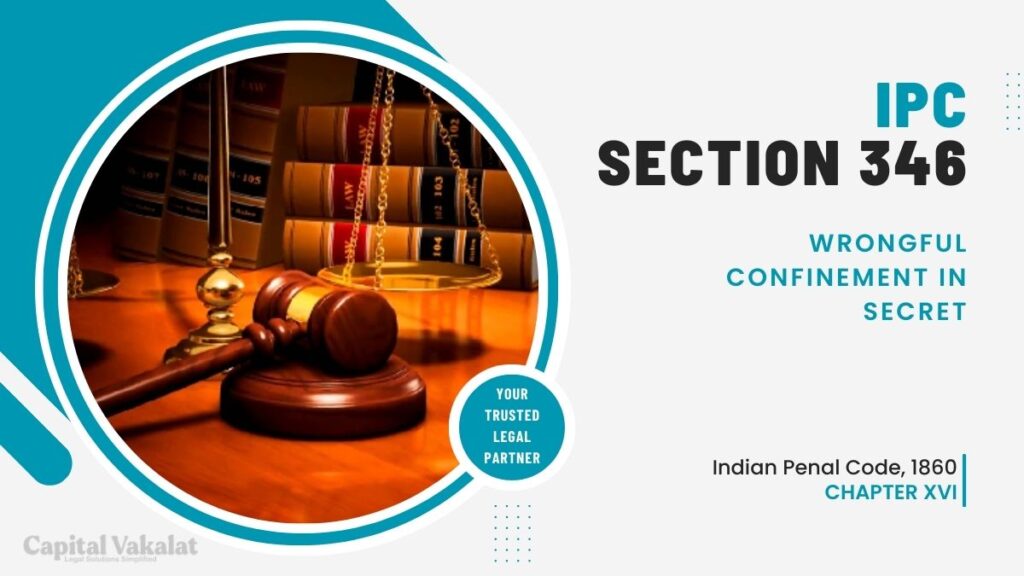In the realm of legal intricacies, Section 346 of the Indian Penal Code (IPC) stands as a silent guardian, addressing the gravity of wrongful confinement conducted in secret. This provision, often overshadowed by its more well-known counterparts, conceals a labyrinth of legal implications.

In this article, we embark on a journey to unravel the nuances of Section 346 IPC, exploring its facets, implications, and the significance it holds in the legal landscape.
Understanding Section 346 IPC: Peering into the Shadows
Section 346 IPC, nestled in the annals of the Indian Penal Code, pertains to wrongful confinement in secret. Unraveling its complexity requires delving into the essence of the law. Wrongful confinement, as elucidated by legal precedents, refers to the illegal restraint of a person against their will, leading to an infringement of their liberty. When this transpires in secret, away from the public eye, the implications become even more profound.
The Genesis of Section 346: Tracing Legal Roots
To comprehend the significance of Section 346, one must trace its legal roots. The provision finds its origins in the meticulous drafting of the Indian Penal Code in 1860, reflecting the societal concerns of the time. The architects of the code aimed to strike a delicate balance between safeguarding individual liberty and maintaining public order.
Unveiling the Elements of Wrongful Confinement: A Legal Tapestry
Section 346 delineates the elements that constitute wrongful confinement. It requires a meticulous examination of the circumstances surrounding the act, ensuring that confinement occurs against the will of the person involved. The secretive nature of the act adds a layer of complexity, emphasizing the need for a thorough understanding of the legal tapestry.
The Legal Ramifications: Navigating Consequences
Wrongful confinement in secret is not a trivial offense. The legal ramifications of Section 346 IPC are far-reaching, encompassing both criminal and civil consequences. Offenders may find themselves entangled in a web of legal proceedings, facing penalties commensurate with the severity of their actions. The law, in its wisdom, seeks to balance punishment with the intent and impact of the wrongful confinement.
Navigating Legal Precedents: Case Studies and Interpretations
To shed light on the practical application of Section 346 IPC, delving into legal precedents becomes imperative. Notable cases serve as beacons, guiding the interpretation and application of the law. Through the lens of these cases, the contours of wrongful confinement in secret become clearer, providing a roadmap for legal practitioners and scholars alike.
Challenges in Prosecution: The Legal Tightrope
Prosecuting cases under Section 346 poses its own set of challenges. The secretive nature of the offense often leads to a dearth of witnesses, making the establishment of guilt a legal tightrope. Overcoming these challenges requires legal acumen, investigative prowess, and an acute understanding of the dynamics surrounding wrongful confinement.
The Intersection of Human Rights: Safeguarding Dignity
Beyond the legal labyrinth, Section 346 also intersects with the realm of human rights. The provision is aligned with the broader ethos of protecting individual dignity and liberty, reflecting the principles enshrined in the Constitution. As society evolves, the application of Section 346 must be contextualized within the broader framework of human rights.
Empowering the Victim: Legal Safeguards and Remedies
Section 346 IPC does not merely focus on punishment; it also seeks to empower the victim. The legal framework provides remedies and safeguards to those who have endured wrongful confinement in secret. Understanding these mechanisms is crucial for ensuring that justice is not only served but that victims are afforded the support and redress they deserve.
Addressing Ambiguities: The Call for Legal Reform
As with any legal provision, Section 346 is not immune to criticism and ambiguity. The call for legal reform echoes in legal circles, urging lawmakers to revisit and refine the language of the law. Clarity and precision are paramount, ensuring that the provision serves its intended purpose without becoming a tool for unintended consequences.
Conclusion: Illuminating the Shadows
In conclusion, Section 346 IPC emerges as a formidable legal instrument, addressing the clandestine act of wrongful confinement. As we navigate the shadows of legal intricacies, understanding the nuances of this provision becomes imperative. It stands not only as a deterrent against unlawful acts but also as a guardian of individual liberties, contributing to the broader tapestry of justice.
Frequently Asked Questions
How can one prove wrongful confinement in secret in a legal context?
Proving wrongful confinement often requires a meticulous examination of the circumstances, witness testimonies, and supporting evidence that establish the act was conducted against the will of the person involved.
What legal remedies are available to victims of wrongful confinement?
Victims can seek legal remedies such as compensation and redress through the criminal justice system and, in some cases, through civil litigation.
Are there any recent amendments or proposed changes to Section 346 IPC?
As of my knowledge cutoff date in January 2022, there were no recent amendments. However, it’s advisable to check for any legislative updates beyond that date.
How does Section 346 IPC align with international human rights standards?
Section 346 aligns with the broader principles of human rights, particularly those related to individual liberty and dignity. Its application should be in harmony with international standards to ensure justice is served.